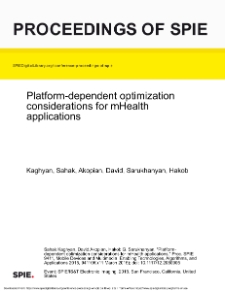Object
Title: Platform-dependent optimization considerations for mHealth applications
Co-author(s) :
Akopian David ; Sarukhanyan Hakob
Abstract:
Modern mobile devices contain integrated sensors that enable multitude of applications in such fields as mobile health (mHealth), entertainment, sports, etc. Human physical activity monitoring is one of such the emerging applications. There exists a range of challenges that relate to activity monitoring tasks, and, particularly, exploiting optimal solutions and architectures for respective mobile software application development. This work addresses mobile computations related to integrated inertial sensors for activity monitoring, such as accelerometers, gyroscopes, integrated global positioning system (GPS) and WLAN-based positioning, that can be used for activity monitoring. Some of the aspects will be discussed in this paper. Each of the sensing data sources has its own characteristics such as specific data formats, data rates, signal acquisition durations etc., and these specifications affect energy consumption. Energy consumption significantly varies as sensor data acquisition is followed by data analysis including various transformations and signal processing algorithms. This paper will address several aspects of more optimal activity monitoring implementations exploiting state-of-the-art capabilities of modern platforms.
Publisher:
Date of publication:
Identifier:
oai:noad.sci.am:136142
DOI:
ISSN:
Language:
Journal or Publication Title:
Proceedings of SPIE - The International Society for Optical Engineering
Volume:
URL:
Affiliation:
Institute for Informatics and Automation Problems ; The University of Texas at San Antonio
Country:
Indexing:
Object collections:
- Digital Library > Academic Insitutions > Insitute for Informatics and Automation Problems of NAS RA > Publications
Last modified:
Apr 19, 2021
In our library since:
Apr 19, 2021
Number of object content hits:
96
All available object's versions:
https://noad.sci.am/publication/149395
Show description in RDF format:
Show description in OAI-PMH format:
| Edition name | Date |
|---|---|
| Sahak Kaghyan, Platform-dependent optimization considerations for mHealth applications | Apr 19, 2021 |





